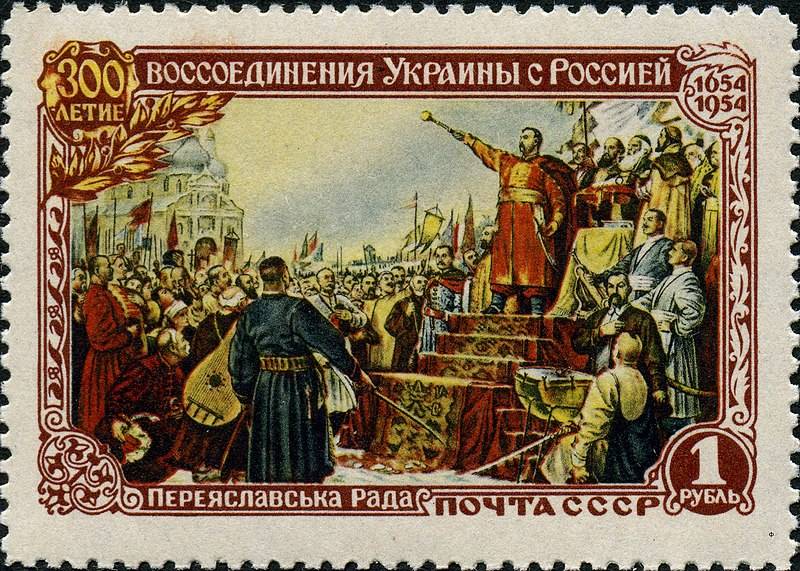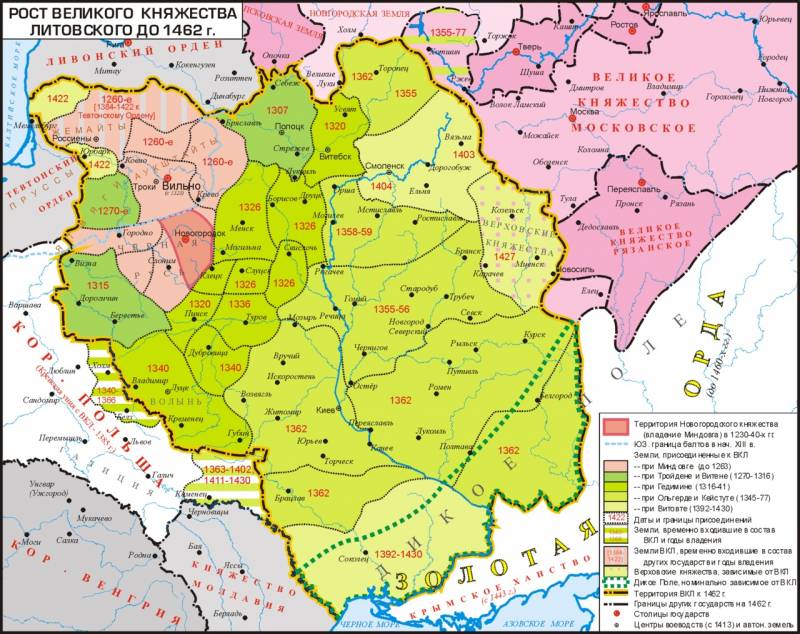The myth of the "birth of the Ukrainian nation" in the Commonwealth

Today in Russia there is a popular myth that the Ukrainian ethnos was born in the Commonwealth. During the Polish occupation, the Russians in the southwestern part of Russia were Polonized, and so the "Ukrainians" appeared.
In Ukraine itself, this myth, which became dominant in Soviet historiography (earlier, Russians in Great and Little Russia were not divided into different peoples), have already been discarded. There now dominates the myth that the real Slavs and direct heirs of Kievan Rus (“Rus-Ukraine”) are “Ukrainians”. At the same time, many Ukrainian authors have agreed that the “ancient Ukrainians” are supposedly the most ancient people on the planet, respectively, the “Ukrainian language” is supposedly the parent language of all Indo-European peoples (The adventures of the "ancient proto-Ukrainians").
Western Russia in the XNUMXth - early XNUMXth centuries. was completely Russian
Just enough to take historical sources of the Middle Ages to see that ethnically, culturally and linguistically, the Russian land (Rus) was Russian. Sources do not know any "Ukrainians". The same situation persisted in the XIV-XVI centuries, when Polotsk, Kyiv, Galicia-Volyn, Seversk, Smolensk and other lands fell under the rule of the Polish-Lithuanian feudal lords. In Lithuanian Rus, Russian people still lived with their inherent faith, national mentality, language and culture. The existence of "Ukrainians" in the Commonwealth is a myth.
Until the very end of Galicia-Volyn Russia, its rulers were called "sovereigns of Russia", "kings of Russia", money "Russian coin", "Russian pennies" was minted. Until the beginning of the XNUMXth century, the Galicians considered themselves "Russian-Rusyns". Only large-scale Ukrainization, Polonization of Western Russia, and then the most severe terror, repressions that led to the physical destruction of tens of thousands of Russians and the flight of hundreds of thousands of people who identified themselves with Russia ("History of the destruction of Russian Galicia"), allowed to change the national composition of Galicia. The remaining Russians were "Ukrainized", they had to accept the "Ukrainian chimera".
But even in 100 years it is impossible to create an ethnos-people, this requires much more time. For example, even now there is no American ethnic group, there is a set of completely different racial, national-linguistic, religious and cultural groups that can fall apart at any moment. Enough to destroy the "American dream" and the dominance of the dollar.
Lithuanian Rus and Little Russia
After the capture of part of the lands of the Kiev region by Lithuania, its princes took the title: "Grand Duke of Lithuania, Zhmud and Russian." Lithuania consisted of two-thirds of the Russian lands and the Russian population. The Russian language was the state language, laws were published in it, legal proceedings were conducted, Russians prevailed in the squads and regiments of Lithuania. The statute of the Grand Duchy of Lithuania (a collection of fundamental laws) was adopted three times: in 1529, 1566 and 1588 in Russian. Even in the third edition of the Statute, it was prescribed:
Governors and elders were supposed to have among their assistants people who knew Russian letters.
Under the last Galician-Volyn princes, the term "Little Russia" appeared. So in Byzantium they began to call Volyn, Galicia, Vladimir-Volyn, Kholm, Przemysl, Lutsk and Turov lands. Over time, the name "Little Russia" (Little Russia) extends to all Russian lands that fell under the rule of Lithuania and Poland. The Polish king Casimir III the Great, having captured Galician Rus, styled himself "King of Lyakhia and Little Russia."
Nothing has changed in the XV-XVI centuries. Russians still lived in Little Russia. Nobody knows about the "Ukrainians" in it. In the book of the Polish Jesuit Piotr Skarga "On the unity of the Church of God" (1577), where a plan was developed to spread the union among the Russians, we read:
Other documents show that during this period there was an expansion of Catholicism, Jesuitism and Polonization. No "Ukrainians" and "Ukrainization". The West is fighting against Russianness, the Russian church, the Russian language. In the message of the Galician-Podolsk laity dated 1583 to Metropolitan Onesiphorus of Kiev we read:
Lviv residents write to Moscow Patriarch Job about the invasion of Catholicism:
The birth of "Ukrainian"
Obviously, the Polish elite was worried about the fact that a huge number of citizens were Russians, and that the Russian state was constantly strengthening and growing near the borders of the Commonwealth. It was necessary to divide Great and Little Russia, to inspire people that another tribe lives outside Russia-Russia. Weaken the Russian kingdom by pitting the Russians against each other.
At the end of the 1587th century, the foundations of the idea that in the future would be called “Ukrainianism” were born in Poland. In the message of the Polish king Sigismund III (1632-1596) to the Pope of XNUMX regarding the church union, we see:
Thus, the so-called. "Muscovites-Muscovites" and their mythical homeland "Muscovy", as "two Russian nationalities" - a Polish invention, supported by the Vatican. In Poland, they began to portray Russians in Little Russia as a completely separate people, the true heirs of Kievan Rus. And the "Muscovites" as the descendants of the Finno-Ugric tribes and the Tatar-Mongols.
The Russians in Little Russia (future "Ukrainians") sought to turn into the "cannon fodder" of Poland in the eternal war between Poland and Russia-Russia. Little Russians became a kind of Janissaries - ethnic outcasts, who were trained to fight the people to which they belonged by blood. The Turks took away children and youths from the Balkan Slavic peoples and raised them in hatred for their relatives. It turned out Ivans, who did not remember kinship, but fiercely hated the enemies of the Sultan and Islam. So the "Ukrainians" by origin, language and faith are Russians, they fiercely hate other Russians and Russia.
It is enough to take historical sources to make sure: there were no “Muscovites” on the territory of Russia. This is a purely Western, artificial term. Russians and their neighbors still call the people on the lands of Vladimir, Moscow and Novgorod Rus - Russians, and the land - Russian, Rus and Russia. Many sources, including modern genetic and anthropological studies, show that in Russia, which the sources call "Great", there were no fundamental, large-scale changes in the population. The Russians have no "Mongol-Tatar" heritage. They retained their racial, linguistic and national identity for many millennia.
"Ukraine" - outskirts
During the XIV-XVI centuries. along with the former name Rus (Russia), new ones appear in the sources to designate two parts of the Russian land. Russian Lithuania, Russian lands under the rule of the Polish queens and the Grand Dukes of Lithuania are called Little Russia, Russia. Northern Russian lands are called Great Russia (Russia). There are no fundamental ethnic changes in Little and Great Russia. Communities of Poles and Jews appear in Little Russian cities. In Great Russia, the Horde (mostly former Polovtsy), racially representatives of the white race, accept Orthodoxy and become Russians almost in the very first generation.
Russians live in both Little and Great Russia. No "Ukrainians" were noted at that time. The dismembered Russian people completely preserved their faith, linguistic, cultural and mental unity. Thus, there were spiritual and material prerequisites for the unification of all Russians into a single state under the rule of their Russian sovereign. Therefore, the Russians of Little Russia in the XNUMXth century began a national liberation war against the Polish religious, national and economic yoke. They rebelled against the policy of de-Russification. Which eventually ended with the liberation and reunification of the Russian lands.
The false concept of the alleged "national liberation struggle of the Ukrainian people" was created much later. There were no "Ukrainians" at that time yet. The Russians - Cossacks, peasants and townspeople - fought against Pan Poland, they were supported by the Russian Church in the person of their best leaders. The Russians defended their will, the right to be themselves, to speak Russian, to go to Russian churches, not wanting to be Polish "claps" - slaves.
Bohdan Khmelnitsky sent out letters that he was going to free the "Russian people" from "Lyash (Polish) captivity." The Polish Hetman Sapieha wrote:
The very word "Ukraine" was then used in Russian and Polish sources only as a designation for "outskirts". The term was applied to a wide variety of territories that had nothing to do with modern Ukraine. For example, this was the name of the border lands of the Polotsk land, the border lines of Lithuania and Wallachia, the most diverse "Ukraine" (frontier lands) of the Russian state. The Poles at that time by "Ukraine" also meant the border area, the outskirts. In particular, the "Ukraine" of Moscow and Tatar - on the border with Russia and the Wild Field.
Thus, no “Ukrainians” lived in Western (Little) Russia, Russians lived there, just like 300-800 years ago. Russian hetman Bogdan Khmelnitsky began the Russian liberation war, for the liberation of the Russian people from the Polish yoke. The ideology of "Ukrainianism" was only begun to be created by the Polish lords, the Jesuits, in order to split off part of Russia and the Russian people from Great Russia-Russia. They planned to use part of the Russian people as "cannon fodder" - Janissaries. It took a lot of time and control over education to penetrate the ideology of “Ukrainianism” into the masses. Russia, having returned Little Russia to its composition, stopped the process of such Polonization-Ukrainization. This Polish trend was revived among the Ukrainian intelligentsia only in the XNUMXth century.

Information